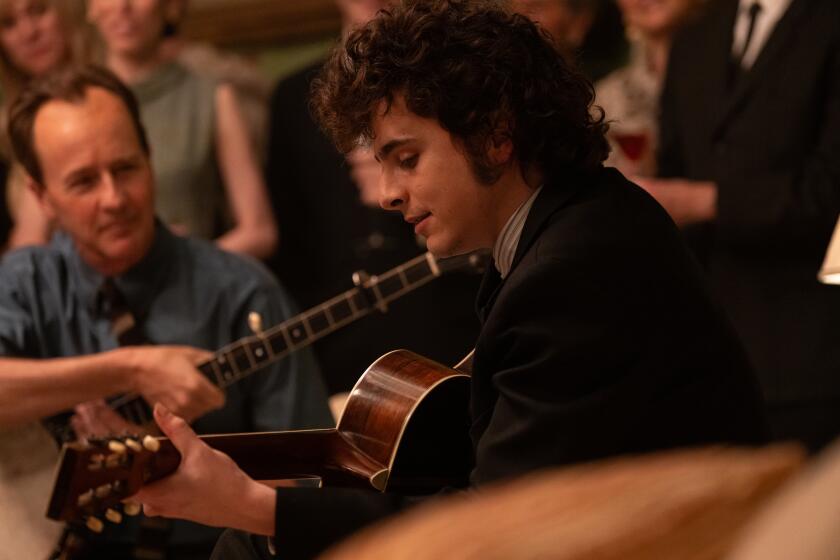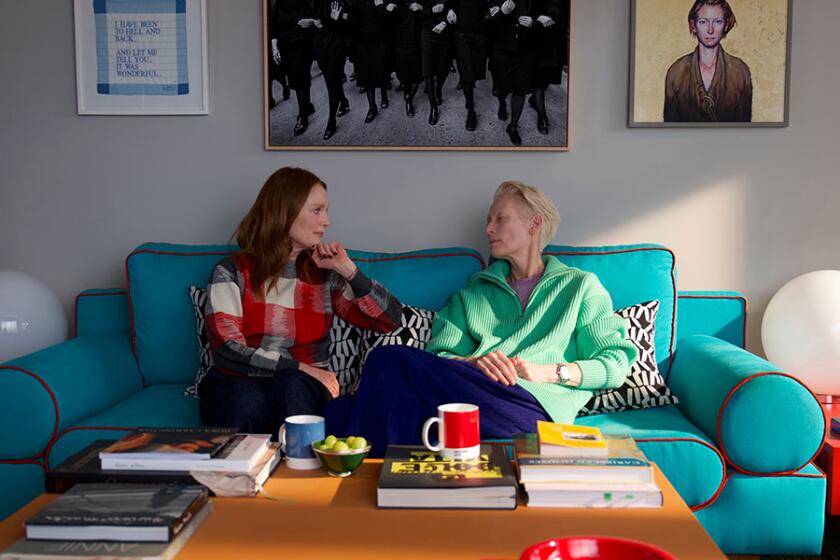Indie Focus: Agnes Jaoui’s passion for therapy, filmmaking
- Share via
“I’m trying to beat Woody Allen,” said French filmmaker and actress Agnès Jaoui, whose work has often been compared to that of the New York laureate of manners and anxiety. Yet Jaoui wasn’t talking the quality or quantity of her movies. She was talking about therapy.
“Let It Rain,” Jaoui’s third film as director, costar and cowriter, opened in Los Angeles on Friday, and she contends that she couldn’t do what she does without therapy. So she is perhaps only partly joking when she says she hopes to outlast Allen for how long she can keep herself on the couch. Jaoui, 45, was in therapy for 12 years, stopped for a few years and has now been back at it for four. And she can tell that it’s helped with her filmmaking.
“I had the feeling it was good for my writing very early on,” Jaoui said of the relationship between her therapy and her work. “It’s a passion to discover how people behave and why and how different we are. That’s the point.”
“Let It Rain” follows two hapless would-be documentarians as they try to make a film about successful women. Karim (popular French comedian Jamel Debbouze) is also a hotel receptionist, while Michel (Jean-Pierre Bacri, who cowrote the film) is a self-styled reporter of no apparent pedigree. Jaoui plays a big-city feminist writer returning to her provincial hometown in the South of France to enter politics. Her path intersects with that of the bumbling filmmakers, setting in motion a series of personal revelations.
As the story unfolds, relationships and connections between the characters are slowly revealed, providing a steady series of reorientations.
“I love that in real life,” said Jaoui, “that moment of changing perspective, a kind of revelation like you can have in a good therapy session. You suddenly understand why your mother was behaving like that. Everything is for a reason.”
For “Let It Rain,” Jaoui and Bacri, who write with two notepads and pencils, concocted a storyline that allowed them to touch on many sub-themes — feminism, immigration, sibling rivalry, class tensions, politics — under the umbrella of a larger conceit. Jaoui acknowledged that it might be too much, but she and Bacri hoped they could pull off the transitions.
“For us,” she said, “the main theme was how all these people, with their different subjects and problems, the common agent is that they all feel the victim of something and they all need to be recognized in their pain. People say, ‘I suffered, I suffered,’ sometimes forgetting others are suffering too.
“So that’s how we managed to feel there was a main theme leading all that,” she said before adding just the right touch of Allen-esque self-deprecation. “Well, that’s our feeling.”
Documentarian
Jody Lee Lipes has become one of the hottest indie cinematographers, and his work on “Afterschool” and “Tiny Furniture” has been singled out in nearly every review of those films.
How Lipes really sees himself, though, is as a director. His documentary “Brock Enright: Good Times Will Never Be the Same” is being released Tuesday on DVD and Blu-Ray by the label Factory 25. A portrait of the controversial American artist as a young terror, the film comes in a package that includes a vinyl LP of music recorded by Enright, a conversation between Enright and artist Robert Longo as well as a short film and additional video loops by Enright.
The film captures Enright preparing his artwork for an important 2007 gallery show. The graphic, confrontational elements of Enright’s work, at times so explicit and in-your-face (this is, after all, the guy who made a name for himself staging a fake kidnapping) that some people have a hard time accepting it as art, make him a difficult subject to evaluate.
“I felt I just wanted to tell the story of what was going on,” Lipes, 28, said recently. “I don’t feel like a fan of Brock’s. I have a lot of respect for some of the work he does, and some I don’t feel I quite get. I feel that way about the art world too — I get why it exists, but I also think it’s totally ridiculous.
“You have to draw a distinction in your mind. You have to be able to say, ‘This is Brock, and I can agree or disagree with the way he conducts his business,’ but the film framed this and dealt with bigger issues about creativity and how creative people deal with the people around them.”
Lipes also recently shot and codirected the exquisite “NY Export: Opus Jazz,” a new staging of choreographer Jerome Robbins’ famous “ballet in sneakers” that aired on PBS, and he is shooting a project for documentarian Margaret Brown.
“I really like documentary, but it can be frustrating after the fact because it gets kicked to the side and overlooked a lot more,” he said. “I think the next thing I have to do as a director, to not just be a camera guy who makes little movies on the side, is to make a strictly narrative feature.”
More to Read
Only good movies
Get the Indie Focus newsletter, Mark Olsen's weekly guide to the world of cinema.
You may occasionally receive promotional content from the Los Angeles Times.











